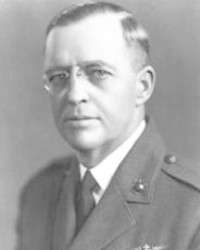Hall of Fame
Cunningham, Lt. Col. Alfred Austell

Atlantan Alfred Austell Cunningham was a foot soldier at the tender age of 16, called as a corporal with the 2nd Georgia Infantry Volunteers to serve in Cuba in 1899. Commissioned a Marine second lieutenant in 1909, he spent spare time tinkering with a primitive flying machine "Noisy Nan" which never made it off the ground, but Cunningham became the first Marine Corps aviator and a key figure in naval aviation history. Winning wings at the U.S. Navy Aviation Camp in 1912, he was at Guantanamo, Cuba within the year for the first Naval Aviation exercises with the fleet. Grounded in 1913 by love for his wife-to-be, Cunningham returned to the air in 1916 to become the first pilot to catapult off a moving ship, and the first Marine or Navy officer to take up land flying.
A tireless advocate of naval aerial strength, he helped select aviation base and Navy station sites. He established, equipped and commanded an Aviation Company for a Marine Corps Advance Base Force. In a quick tour of the WWI front, November 1917 - January 1918, he investigated virtually every aviation activity. He recommended, organized, equipped and commanded the Northern Bombing Group: 72 aircraft and 1,206 officers and enlisted men who flew 57 missions in late 1918. Cunningham received the Navy Cross in 1920, retired as lieutenant colonel in failing health in 1935 and died in 1939. The air field at Cherry Point and a U.S. Destroyer were named in his honor.
Alfred Austell Cunningham was enshrined May 18, 1991, a pioneer airman and the first United States Marine Corps pilot.
